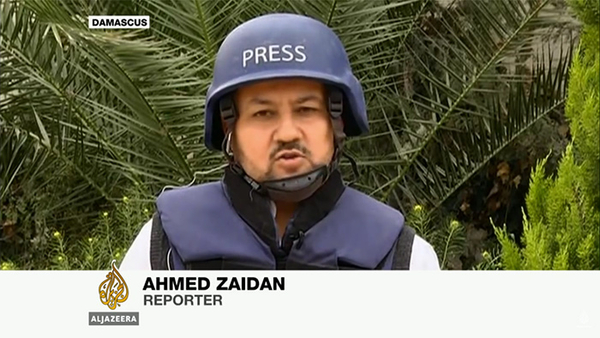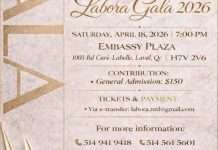
Zaidan’s comparisons should raise concerns about whom the Obama administration designates as terrorists — or even chooses as strategic partners: If these groups are not America’s enemies, who is? Whatever sympathies he may have for the Al Nusra Front, Zaidan’s loyalty to the ethics of his profession and his responsibility to his readers evidently do not outweigh his loyalties to a terrorist organization. Why is Ahmad Zaidan, Al Jazeera’s Islamabad bureau chief, tacitly endorsing a terrorist organization? In an op-ed for Al Jazeera’s English website on June 2, entitled “Nusra Front’s quest for a united Syria,” Zaidan writes that the Islamist militant rebel group in Syria is distancing itself from Al-Qaeda and “positioning itself as the natural heir of jihadi ideology.”
The Al Nusra Front, Al-Qaeda’s offshoot in Syria, is one of the largest, most powerful and best-organized rebel groups fighting the Assad regime, and in December 2012 it landed on the U.S. State Department List of Terrorist Organizations. Officially designated as an alias of Al-Qaeda, Al Nusra was branded for the more than 600 attacks it had claimed responsibility for since November 2011, many of which had taken the lives of innocent Syrian civilians. Recent victories as part of a rebel coalition against the Assad regime in the northwest province of Idlib have further bolstered Al Nusra and strengthened the group’s leadership position among Syria’s anti-government forces.
Zaidan’s bias in favor of Nusra is clear almost immediately, when he notes that when he was covering Al-Qaeda and the Taliban in Afghanistan, his “hosts” from those two terror organizations never offered him more than “simple tea and bread for breakfast,” whereas his Al Nusra hosts had generously laid out a “dozen dishes” for him. However, his appreciation of a wider range of breakfast options quickly turns to using his position as a leading reporter for the most influential news network in the Middle East — and the larger Muslim world — essentially to act as a mouthpiece for Al Nusra. Ahmad Zaidan, Al Jazeera’s Islamabad bureau chief, is shown here reporting from Damascus, Syria. (Image source: Al Jazeera video screenshot) Zaidan recounts and quotes extensively from a separate interview conducted by Al Jazeera Arabic on May 27 with Al Nusra’s leader, Abu Mohammad al-Jolani, to emphasize differences between Jolani’s leadership tactics and those of Al-Qaeda under Ayman al-Zawahiri.
Zaidan writes that Jolani “defies al-Qaeda’s legacy of going after minorities,” highlighting a promise from Jolani that if the Alawites (an offshoot sect of Shia Islam to which Syria’s ruling family and many of its supporters belong) were to abandon the Assad regime, they “would be welcome” in a new Syria. Jolani, according to Zaidan, also promised that Druze communities in Syria would be protected; as a result of that statement, he has received support from Walid Jumblatt, leader of the Lebanese Druze. The problem with Zaidan’s translation of the interview with Jolani from Arabic to English is that he leaves out a critical caveat that Jolani made regarding protection of the Alawites, considered by many Sunni Islamists, including Al-Qaeda and Al Nusra, not to be true Muslims, but apostates of Islam. A Guardian article, reporting on Jolani’s interview with Al Jazeera, accurately translated Jolani’s relevant quote as: “If the Alawites leave their religion and leave Bashar al-Assad, we will protect them.” [Emphasis added.]
Zaidan seemingly manipulated the original quote to obscure that Al Nusra is, in fact, not tolerant of other religions or religious minorities, and that only religious conversion would allow Alawites to remain safely in Syria under Al Nusra leadership. Also absent from Zaidan’s characterization of Al Nusra as more tolerant than Al-Qaeda, is any mention of Syria’s significant Christian minority, which makes up about 10% of the population. The Guardian article, however, does translate Jolani’s remarks on Christians; his words are far from accepting. The Guardian paraphrases Jolani as saying that “in a future state ruled by Islamic law, the financially capable would pay ‘jizya,’ or tax reserved for non-Muslims.” Zaidan’s misleading translation and editing of Jolani’s interview reveal more than bias: they demonstrate a violation of a basic principle of journalistic ethics: not to manipulate quotes from sources in a way that fundamentally changes their meaning. Zaidan has done just that — and to support a terrorist organization, no less.
Many who commented on Zaidan’s article noticed his deceitful omission. Journalist Evan Hill, who speaks Arabic and has covered the Middle East for both Al Jazeera and the Guardian, tweeted, “Is it me or does Zaidan leave out the part of the Alawite quote where he said ‘give up your beliefs’?” Having less-than-subtly revealed his support for Al Nusra, Zaidan continues sounding off as an unofficial media spokesman for the group. He cites “recent leaks” that Al Nusra leaders have decided to leave “the al-Qaeda umbrella and operate exclusively as a Syrian party aiming to establish an Islamic State,” although a public announcement of such a break has yet to happen. According to Zaidan, “[S]uch a move, whenever made, would not only satisfy Nusra’s followers,” of which Zaidan certainly seems to be one; it would “also pull the carpet from under the feet of ISIL.” In other words, as his article’s subtitle, “Nusra Front is positioning itself as the natural heir of jihadi ideology,” makes clear, Al Nusra sees itself as the group that will upstage the Islamic State (ISIS/ISIL) to control Islamist jihadi ideology in Syria — hardly a comforting alternative to Assad and ISIS. The Middle East — especially Syria and Iraq — needs a great deal of humanitarian aid just now; what it does not need is competition between brutal, seventh century-styled Islamic states. Nevertheless, Zaidan seems to be of the opinion that the way to take down ISIS is a competing caliphate.
Certainly, the half-hearted U.S.-led strategy for fighting ISIS has thus far failed to produce any promising signs that ISIS is on the retreat — especially since the loss of Ramadi in Anbar province last month. Leaving terrorist groups to duke it out, however, has also failed to end the conflict. The excuse Zaidan offers for his support of Al Nusra is that the international community — as well as any non-Islamist rebel forces on the ground in Syria — have failed to help citizens under siege from the Assad regime, and that these failures have led to increased sympathy among the population for Islamist rebel groups who “exercise real power.” While this is an accurate, although overly simple, assessment of the situation in Syria, it hardly seems a sufficient reason for Zaidan, as a leading reporter for a major global news network, with unparalleled media influence in the Muslim world, to endorse the cause of a terrorist organization.
To Zaidan, however, not only is the current situation in Syria reason enough to throw his support behind Al Nusra, it is also a reason to chastise the United States for not having already gotten on the group’s bandwagon. Comparing Al Nusra to the Palestine Liberation Organization (PLO), Zaidan writes: “Washington used to depict the PLO as a terrorist outfit — but then took a U-turn.” Zaidan’s use of the word “depict” is telling; to him, Al Nusra is not a terrorist group; rather it is unfairly being labeled one by the United States. Instead, he suggests that the U.S. should repeat history and change its tactics toward Al Nusra. However, this change would entail the U.S. supporting a group that does not believe in religious tolerance even among Muslims; that views Christians as second-class citizens, and that uses terrorist tactics, including the attempted use of chemical weapons, in its fighting against the Assad regime, just as the regime has done.
Zaidan draws another parallel to support Al Nusra: between Al Nusra and the Taliban in Afghanistan. He notes that the group was “once the main target of the US military, but is not currently designated as a ‘terrorist organization’ by either the UN, UK or the US.” Finally, he reminds his readers that Washington no longer brands “Hezbollah or Iranian Quds Force’s Qassem Soleimani” as terrorists. Zaidan argues that since the United States has changed relationships with these current or former terrorist organizations, it should take another extremely dangerous militant Islamist group off its terrorist list.
However, Zaidan’s comparisons should raise concerns about whom the Obama administration designates as terrorists — or even chooses as strategic partners: If these groups are not America’s enemies, who is? Zaidan proceeds to call the Obama administration hypocritical for supporting “alien” Shia militias “fighting on behalf of Baghdad,” but not demonstrating the same support for “Syrian fighters — such as those who make up Nusra’s ranks” waging war against Assad. Again, Zaidan’s argument should give the White House pause as to whom the U.S. is partnering with in Iraq. Iranian-backed Shia militias, while they may be committed to fighting ISIS, can hardly be considered long-term partners for a stable Iraq.
In his closing thoughts, Zaidan makes a half-hearted attempt to mention the importance of “tolerance” and “build[ing] bridges” in Syria, although given his support for a group whose goal is supposedly to convert everyone to its extremist brand of Sunni Islam or force discriminating taxes on them, honest reconciliation does not seem to be a priority for him. More alarming than Jolani’s support for Al Nusra and his editorial dishonestly is that Al Jazeera allowed this article to be published. Zaidan is entitled to express his opinions, regardless of how unsettling they might be. This was, after all, an op-ed piece; the disclaimer at the bottom clearly states that the views presented in the article do not represent the views of Al Jazeera. So while Al Jazeera should not have censored Zaidan for the content of his piece, it was irresponsible and unethical to have published an article that, through deceitful editing practices, grossly misrepresents Al Nusra’s ideology. As for Zaidan, whatever sympathies he may have for Al Nusra, his loyalty to the ethics of his profession and his responsibility to his readers evidently do not outweigh his loyalties to a terrorist organization.
Rachael Hanna is Associate Managing Editor of the Harvard Political Review.





















